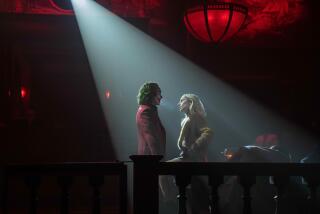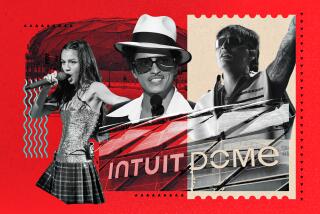They’re Rockin’ at the Multiplex
- Share via
It’s Monday night and you stroll into the neighborhood movie theater to invest two hours in big-screen entertainment and popcorn, but instead of the latest Tom Cruise flick you watch ... the Rolling Stones live from a London club? Or Madonna in Spain? How about Barbra Streisand in Las Vegas?
The concept of watching a hot-ticket concert anywhere in the world beamed live into a multiplex may sound thrilling or just plain odd, depending on your point of view, but don’t rule it out as a possibility. The music industry and movie-house chains took the first, tentative step into the area this week by bringing the rock band Korn, live and loud, into theaters in 30 U.S. markets, including the Bridge Theater in Westchester.
The Los Angeles band was actually prowling the stage at the Hammerstein Ballroom in New York, but thanks to a satellite and new digital technology available at select movie houses, they were also on silver screens across the country in front of about 6,000 fans. The promotion cost the band a few hundred thousand dollars, its manager says, but singer Jonathan Davis said it gave them a chance to celebrate the release of their new album, “Untouchables,” by reaching out to fans in a novel way.
“It’s very, very hard to think of original things to do these days, and this seemed like a way not only to experiment with something really cool but also play in front of a lot of our fans in different places all at once,” Davis said.
Davis also said the idea of Korn fans taking over a movie theater en masse reminded him of the fleeting late-night communities created by “The Last Waltz,” “The Song Remains the Same,” “The Rocky Horror Picture Show” and other music films that became ritual viewing for fans. “This is even better,” Davis said, “because it’s live and anything can happen.”
One thing music industry and film exhibitors would like to see happen is the creation of a new revenue stream. At this point it is impossible to predict whether concerts will become a new staple of cinema house programming or a blip on the screen that lasts as long as 3D glasses.
The concert business has been flat in recent months, losing fans who opt to stay home and buy DVDs instead of venturing out to high-priced shows. Moreover, hip-hop and rap, among the dominant music genres in the past decade, have not yet become a reliable concert draw. The mood of promoters was especially grim after Sept. 11 as travel and drawing large public crowds became increasingly difficult, and the hangover has not been cured completely.
Theater chains, meanwhile, are under pressure from the Hollywood studios to equip their cinemas for digital films. The price tag of digital projection equipment--up to $200,000--is so daunting that many in the business question its value. But some advocates of digital technology say the payoff is in the alternate programming that the new equipment makes possible, such as live concerts, educational programs, corporate functions and other special events. At the very least, they say, the extra offerings could help fill seats from Monday to Thursday, when moviegoing usually drops off.
Andy Maltz, president of Avica Technology Corp., a player in the digital arena, points to a Canadian movie theater chain’s success with the exhibition of pro wrestling events, and the AMC movie theater chain’s test runs with Broadway productions as signposts of what is to come.
Maltz has heard the naysayers who argue that shoehorning live events into the antiseptic environment of a multiplex just adds more distance between art and audience, and ultimately is more a novelty than a new frontier. How can staring at a movie screen compare with going to a club or theater and enjoying live music that has not been filtered through a high-tech machine? There is also the matter of economics--movie exhibitor chains may not be willing or able to handle the financial strains of going digital.
“It’s easy to be negative about these things, but sometimes with something this new you risk it dying on the vine if you are too negative,” Maltz said. “I’d tell the skeptics to try it and see how they like it before they judge.”
Maltz points to the 18,000 fans of the Los Angeles Lakers who paid $10 for seats at Staples Center this week to watch the team’s East Coast victory over the New Jersey Nets on the arena’s monitors. Lacking the opportunity to watch the event in person, they still paid for the communal vibe of a large audience, which Maltz said is a strong indicator of what theaters could do with far better image and sound to offer.
That sentiment is echoed by Ray Nutt, executive vice president of business development for Regal CineMedia, a specialty company within the Regal Entertainment Group. It was the Regal chain that brought the Monday performance to Korn fans, most of whom paid $10 or got their tickets through radio station giveaways.
“It was a wonderful event for us, a larger-than-life screen, great sound, and the kids were dancing in the aisles, literally,” Nutt said. “One interesting take on it all was that a lot of parents who have kids that they consider too young to let go to a concert to see the band said they felt much safer and more comfortable bringing them to a theater.... I think we’re obviously on to something here. I think it’s not out of the question that there might be, for example, a concert night at theaters once a month or something like that.”
The projectors that showed the Korn event were a lower-priced variety, about $20,000 each, but still delivered a higher-quality image that caught the eye of different people in the music industry. The Dixie Chicks and several other acts are already sizing up the idea of the theater-as-promotional-tool, says Peter Katsis, a manager with the Firm, the powerful management company whose clients include Korn and the Chicks.
Concerts West and Spring Communications were also part of the team that engineered the Korn performance project, and Katsis said while the first-time effort was expensive and intensive, he would expect that practice would streamline the entire endeavor.
“A lot of people are hoping this takes off and it’s pretty exciting if you think about the possibilities,” Katsis said. “It’s a big idea to put this music on the big screen.”
More to Read
The biggest entertainment stories
Get our big stories about Hollywood, film, television, music, arts, culture and more right in your inbox as soon as they publish.
You may occasionally receive promotional content from the Los Angeles Times.










